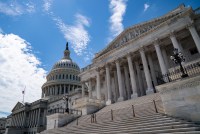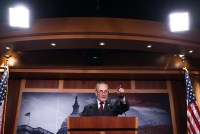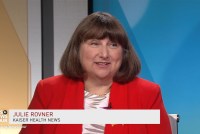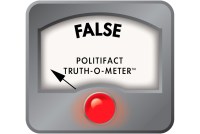Latest KFF Health News Stories
Journalists Recap Coverage of Gun Violence, Drug Imports, and Mental Health
KHN and California Healthline staff made the rounds on national and local media this week to discuss their stories. Here’s a collection of their appearances.
Estados desafían a Biden a que baje precios de medicamentos permitiendo importaciones desde Canadá
En Estados Unidos se pagan unos de los precios más altos del mundo por los productos farmacéuticos de marca. Los medicamentos son generalmente menos caros en el vecino Canadá, donde el gobierno controla los precios.
States Challenge Biden to Lower Drug Prices by Allowing Imports From Canada
Colorado has joined Florida, New Hampshire, and New Mexico in seeking federal permission to import prescription drugs from Canada. President Joe Biden endorsed the approach in his 2020 campaign but has yet to approve any state plan.
KHN’s ‘What the Health?’: Congress Races the Clock
Sen. Raphael Warnock’s re-election in Georgia will give Democrats a clear-cut Senate majority for the first time in nearly a decade. Meanwhile, the current Congress has only days left to tackle major unfinished business on the health agenda, including fending off scheduled pay cuts for doctors and other health providers in the Medicare program. Joanne Kenen of the Johns Hopkins Bloomberg School of Public Health and Politico, Anna Edney of Bloomberg News, and Sandhya Raman of CQ Roll Call join KHN’s Julie Rovner to discuss these topics and more. Plus, for extra credit, the panelists recommend their favorite health policy stories of the week they think you should read, too.
Employers Use Patient Assistance Programs to Offset Their Own Costs
Some insurers and employers are tapping into assistance programs meant for individual patients. The concern: Some costly drugs could be harder for patients to access.
$38,398 for a Single Shot of a Very Old Cancer Drug
Lupron, a drug patented half a century ago, treats advanced prostate cancer. It’s sold to physicians for $260 in the U.K. and administered at no charge. Why are U.S. hospitals — which may pay nearly as little for the drug — charging so much more to administer it?
Pharma-Funded FDA Gets Drugs Out Faster, But Some Work Only ‘Marginally’ and Most Are Pricey
Since pharmaceutical companies started funding their FDA drug applications 30 years ago, the agency’s reviews have gone much faster — perhaps too fast.
KHN’s ‘What the Health?’: On Government Spending, Congress Decides Not to Decide
Congress has once again decided not to decide how to fund the federal government in time for the start of the fiscal year, racing toward a midnight Sept. 30 deadline to pass a stopgap bill that would keep the lights on for two more months. However, it does appear the FDA’s program that gets drugmakers to help fund some of the agency’s review staff will be renewed in time to stop pink slips from being sent. Alice Miranda Ollstein of Politico, Rachel Cohrs of Stat, and Victoria Knight of Axios join KHN’s Julie Rovner to discuss these topics and more. Also this week, Rovner interviews filmmaker Cynthia Lowen, whose new documentary, “Battleground,” explores how anti-abortion forces played the long game to overturn Roe v. Wade.
Centene to Pay $166 Million to Texas in Medicaid Drug Pricing Settlement
Texas is at least the 12th state to settle with St. Louis-based Centene Corp. over allegations that it overcharged Medicaid prescription drug programs.
‘An Arm and a Leg’: The New Cap on Medicare Drug Costs
In this episode, Julie Rovner, chief Washington correspondent for KHN, guides listeners through decades of dealings between Congress and Big Pharma.
KHN’s ‘What the Health?’: Wrapping Up Summer’s Health News
President Joe Biden has signed the Inflation Reduction Act and Congress is gone until after Labor Day. But the administration and lawmakers left lots of health policy achievements behind, including new rules to facilitate the sale of over-the-counter hearing aids and a potential reorganization of the Centers for Disease Control and Prevention. Anna Edney of Bloomberg News, Alice Miranda Ollstein of Politico, and Joanne Kenen of the Johns Hopkins Bloomberg School of Public Health and Politico join KHN’s Julie Rovner to discuss these issues and more. Also, for extra credit, the panelists suggest their favorite health policy stories of the week they think you should read, too.
Para las familias médicamente vulnerables, la presión de la inflación es inevitable
Para millones de familias que viven con enfermedades crónicas, trastornos cardíacos, diabetes y cáncer, u otras condiciones debilitantes, la inflación está demostrando ser un doloroso flagelo que podría perjudicar su salud.
For Medically Vulnerable Families, Inflation’s Squeeze Is Inescapable
Inflation hasn’t hit Americans like this in decades. And families living with chronic diseases have little choice but to pay more for the medicine, supplies, and food they need to stay healthy.
Big Pharma Went All In to Kill Drug Pricing Negotiations
For more than a century, the drug industry has issued dire warnings of plunging innovation whenever regulation reared its head. In general, the threat hasn’t materialized.
Inflation Reduction Act Contains Important Cost-Saving Changes for Many Patients — Maybe for You
The legislation, which the House is expected to pass Friday, would allow the federal government, for the first time, to negotiate the price of some drugs that Medicare buys. It also would extend the enhanced subsidies for people who buy insurance on the Affordable Care Act marketplaces.
KHN chief Washington correspondent Julie Rovner discusses the Senate Democrats’ plans to let Medicare negotiate some drug prices, cap out-of-pocket drug costs for seniors, and fund enhanced subsides for ACA marketplace health plans.
Ad Targeting Manchin and AARP Mischaracterizes Medicare Drug-Price Negotiations
The advocacy group American Commitment said empowering Medicare to negotiate drug prices would raid it of billions of dollars. Drug pricing experts say that that’s not the case and that such policies would instead reduce costs for the Medicare program and seniors.
KHN’s ‘What the Health?’: Drug Price Bill Is a Go in the Senate
Two things happened in Washington this week that were inevitable: President Joe Biden tested positive for covid-19, and the Senate agreed to move forward on a budget bill that includes only a sliver of what Biden hoped it would. Still, the bill to allow Medicare to negotiate some drug prices, cap out-of-pocket drug costs for seniors, and extend temporary subsidies for Affordable Care Act insurance premiums would represent a major step if Democrats can get it across the finish line. Meanwhile, abortion battles continue to escalate around the country, with Texas leading the way in restrictions. Shefali Luthra of The 19th, Joanne Kenen of the Johns Hopkins Bloomberg School of Public Health and Politico, and Rachel Cohrs of Stat join KHN’s Julie Rovner to discuss these issues and more. Also this week, Rovner interviews Dr. Jack Resneck Jr., the new president of the American Medical Association.
Seeking to Kick-Start Biden’s Agenda, Schumer Unveils a Bill for Medicare Drug Price Negotiations
In addition to allowing federal officials to negotiate the price that Medicare pays for some drugs, the bill would cap annual out-of-pocket drug costs for Medicare beneficiaries at $2,000. But before Democrats can pass the bill under special rules that prevent Republicans from staging a filibuster, they must get approval from the Senate parliamentarian.
KHN’s ‘What the Health?’: The FDA Goes After Nicotine
The FDA is using its power to regulate tobacco products — ordering the vaping device Juul off the market and announcing its intention to lower the amount of nicotine in cigarettes and other products. Meanwhile, the Supreme Court rules on Medicare and kidney dialysis, and Congress makes progress on legislation surrounding guns and mental health. Joanne Kenen of the Johns Hopkins Bloomberg School of Public Health and Politico, and Rachel Cohrs of Stat join KHN’s Julie Rovner to discuss these issues and more. Also this week, Rovner interviews KHN’s Noam N. Levey about the new KHN-NPR project on the growing impact of medical debt.




















